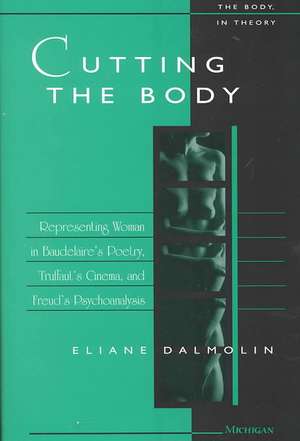Cutting the Body: Representing Woman in Baudelaire's Poetry, Truffaut's Cinema, and Freud's Psychoanalysis: The Body, In Theory: Histories Of Cultural Materialism
Autor Eliane DalMolinen Limba Engleză Hardback – 21 aug 2000
This book is about how poets, filmmakers, and psychoanalysts look upon the female body, how they examine it as if dissecting it--at times relishing it, at others anguishing over its fragmentation. Eliane DalMolin examines how Charles Baudelaire, François Truffaut, and Sigmund Freud, based on their inheritance of lyricism, shaped and perpetuated a cultural understanding of women that they continued to represent in late romantic images, despite their respective innovative talents and influences in bringing about three decisive cultural moments: modernism, New Wave cinema, and psychoanalysis.
The work's originality comes primarily from its unique summoning of three distinct disciplines around the notion of the cut. It places the complex desire to cut the woman's body at the center of an investigation of male identity in Western culture through incisive discussions of poetry, cinema, and psychoanalysis. The terms of this inquiry disclose an uncanny male disposition to femininity and motherhood, and its direct implication in productive acts of cutting. Cutting the Body will appeal to literary scholars, film specialists, feminist theorists, and experts in psychoanalytical theory.
Eliane DalMolin is Associate Professor of French, University of Connecticut. She is coeditor of Sites: The Journal of 20th-Century/Contemporary French Studies.
The work's originality comes primarily from its unique summoning of three distinct disciplines around the notion of the cut. It places the complex desire to cut the woman's body at the center of an investigation of male identity in Western culture through incisive discussions of poetry, cinema, and psychoanalysis. The terms of this inquiry disclose an uncanny male disposition to femininity and motherhood, and its direct implication in productive acts of cutting. Cutting the Body will appeal to literary scholars, film specialists, feminist theorists, and experts in psychoanalytical theory.
Eliane DalMolin is Associate Professor of French, University of Connecticut. She is coeditor of Sites: The Journal of 20th-Century/Contemporary French Studies.
Preț: 526.74 lei
Preț vechi: 663.83 lei
-21% Nou
Puncte Express: 790
Preț estimativ în valută:
100.81€ • 104.85$ • 83.22£
100.81€ • 104.85$ • 83.22£
Carte indisponibilă temporar
Doresc să fiu notificat când acest titlu va fi disponibil:
Se trimite...
Preluare comenzi: 021 569.72.76
Specificații
ISBN-13: 9780472110735
ISBN-10: 047211073X
Pagini: 232
Dimensiuni: 152 x 229 x 25 mm
Greutate: 0.54 kg
Ediția:First Edition
Editura: UNIVERSITY OF MICHIGAN PRESS
Colecția University of Michigan Press
Seria The Body, In Theory: Histories Of Cultural Materialism
ISBN-10: 047211073X
Pagini: 232
Dimensiuni: 152 x 229 x 25 mm
Greutate: 0.54 kg
Ediția:First Edition
Editura: UNIVERSITY OF MICHIGAN PRESS
Colecția University of Michigan Press
Seria The Body, In Theory: Histories Of Cultural Materialism
Notă biografică
Eliane DalMolin is Associate Professor of French, University of Connecticut. She is coeditor of Sites: The Journal of 20th-Century/Contemporary French Studies.
Recenzii
". . . a fascinating book about fragmentation and creation, poetry, cinema, psychoanalysis, and the troubling relationship between the male cutter and the cut-up female body. Providing shrewd insights into the creative process of Charles Baudelaire, Sigmund Freud, and Francois Truffaut, the author argues that these three innovators in three distinct disciplines all looked on the female body in such detail that they seem to be dissecting it."
—C. B. Kerr, Vassar College, Choice, May 2001
—C. B. Kerr, Vassar College, Choice, May 2001
". . . DalMolin's fine analysis offers great depth—whether focused on individual works or particular philosophical or theoretical points—and impressive breadth in terms of primary and secondary sources and makes for stimulating and pleasurable reading. Tracing the destructive masculine logic across disciplines after having elucidated its maturation in Petrarch's Canzoniere, has the benefit of drawing on divergent media and a plethora of examples, and therefore demonstrating the pervasiveness and persistence of a logic that is ultimately shown to be as mutilating to the male subject as it is to the woman cut and fragmented by frames, verses and psychoanalytical thought. DalMolin has produced a theoretically sophisticated, thought-provoking study that should appeal to and enlighten scholars of poetry, cinema, and psychoanalysis."
—Karen Bouwer, University of San Francisco, French Review, Volume 76, No.4
—Karen Bouwer, University of San Francisco, French Review, Volume 76, No.4
Descriere
Explores the notion of the cut in poetry, film, and psychoanalysis and how it might be linked to male creativity




